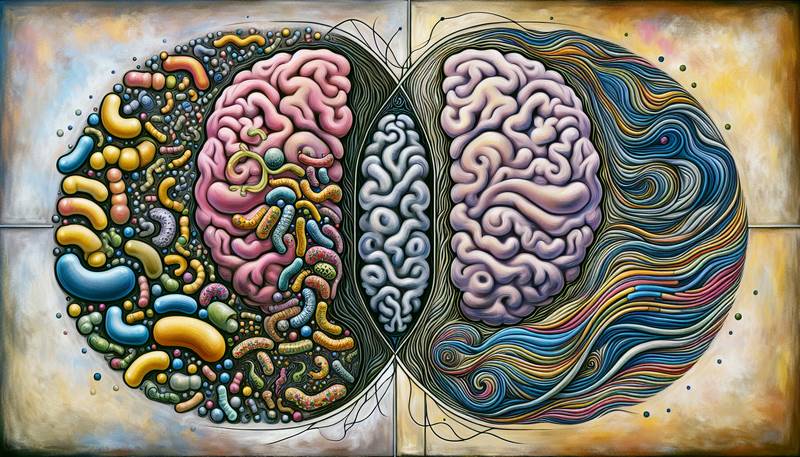Probiotics and Mood Regulation: Gut-Brain Connection Explored

A Mind-Boggling Introduction: The Wonders of Gut BacteriaOne would hardly imagine that the goings-on in the deepest recesses of one's gut could have any bearing on their state of mind, thoughts, or indeed, their very essence. Yet, here we are, on the precipice of scientific discovery, staring down the swirling abyss of this feculent rabbit hole, marveling at the mysterious connection between the bacteria in our bowels and our brains. An exploration of the gut-brain connection may seem stomach-churning to some, but for those with a penchant for the peculiar, it holds a certain je ne sais quoi.A Tale of Two Systems: The Gut and the BrainAt the very core of this curious phenomenon are the vast and varied legions of microscopic organisms that reside within our gastrointestinal tracts. These gut flora, or microbiota if you will, consist of trillions of bacteria belonging to an estimated 1,000 different species. These microscopic denizens of our digestive tracts are far more than mere squatters; they are in fact responsible for a range of essential functions such as digestion, immunity, and even metabolism.The gut, you see, houses a complex ecosystem of bacteria, fungi, and viruses, all working tirelessly to break down the food we consume, extracting valuable nutrients and energy. It is also home to the enteric nervous system (ENS), a network of neurons that is sometimes referred to as the "second brain." The ENS is directly involved in the regulation of gut motility, blood flow, and secretions, but also has a more clandestine role in the regulation of our emotions and mood.The Gut: A Hive of Neurological ActivityIt may come as a shock to learn that the gut is not only responsible for the more mundane tasks of digestion and waste management, but also plays host to a veritable cornucopia of neurotransmitters, chemicals that are instrumental in the transmission of signals within the brain. In fact, the gut is said to produce around 95% of the body's serotonin, a neurotransmitter best known for its role in regulating mood, appetite, and sleep. If that isn't enough to leave you flabbergasted, consider this: the gut also produces gamma-aminobutyric acid (GABA), the brain's primary inhibitory neurotransmitter, which helps to regulate anxiety, stress, and fear.This intricate dance of neurochemicals within the gut is orchestrated by the gut microbiota, which interact directly with the ENS and the central nervous system (CNS). The gut and the brain, it seems, are locked in a perpetual pas de deux, communicating via the vagus nerve, a long, meandering nerve that extends from the brainstem to the abdomen, forming a link between the two systems.Probiotics: A Panacea for the Mind?With the revelation that the gut's microbiota play such a crucial role in the regulation of our emotions and mood, one might wonder whether tinkering with the composition of these microbial communities could hold the key to unlocking new treatments for mental health disorders. Enter probiotics, live bacteria and yeasts that are said to confer a myriad of health benefits, including improved digestive function, a bolstered immune system, and now, perhaps, even mood regulation.Probiotics, which are commonly found in yogurt, fermented foods, and dietary supplements, have gained a considerable following in recent years, with proponents touting their ability to restore balance to the gut's bacterial communities. The potential implications of this bacterial balancing act for mental health are tantalizing, to say the least. Could a daily dose of probiotics hold the key to banishing the blues, calming the mind, or even lifting the fog of more serious mental health disorders?The Science Behind the Hype: Probiotics and MoodWhile the notion of a simple probiotic panacea is undeniably alluring, the reality is somewhat more complex. Research into the gut-brain connection is still in its infancy, and while there is a growing body of evidence to suggest that probiotics may have a positive impact on mood, the precise mechanisms behind this effect remain poorly understood.One study, published in the journal Gastroenterology, found that healthy women who consumed a probiotic-rich yogurt twice daily for four weeks exhibited reduced activity in the brain regions responsible for processing emotions and sensations when exposed to negative stimuli. Another study, published in the Journal of Psychiatric Research, found that supplementation with a combination of probiotics led to a significant reduction in symptoms of depression and anxiety in patients with major depressive disorder.While these findings are certainly promising, it must be noted that the studies in question were relatively small, and the precise strains and doses of probiotics used varied between studies. Furthermore, it is not yet clear whether these mood-enhancing effects are the result of direct interactions between the probiotics and the brain, or if they are mediated by changes in the gut's bacterial communities.Should You Take the Probiotic Plunge?The burgeoning field of gut-brain research is undeniably fascinating, and the idea that a simple probiotic supplement could hold the key to improved mental health is tantalizing. However, it is important to approach these claims with a healthy dose of skepticism, as the science is still in its infancy and much remains to be learned about the complex interplay between the gut microbiota, the brain, and our emotions.That being said, there is little harm in incorporating probiotics into your daily routine, as they are generally considered safe and may offer other health benefits, such as improved digestion and immune function. So why not take the plunge and give your gut a microbial makeover? At the very least, it will provide you with an excellent conversation starter at your next dinner party: "Did you know that my gut bacteria are responsible for my sunny disposition?"
|
|







